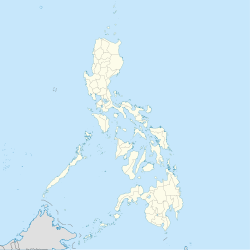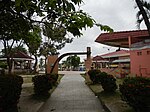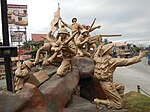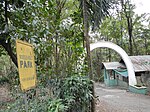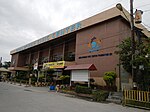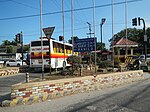Dinalupihan
Dinalupihan | |
|---|---|
| Municipality of Dinalupihan | |
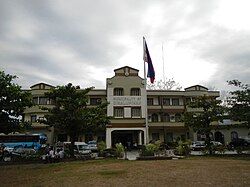 Municipal Hall | |
 Map of Bataan with Dinalupihan highlighted | |
Location in the Philippines | |
| Coordinates: 14°53′N 120°28′E / 14.88°N 120.47°E | |
| Country | Philippines |
| Region | Central Luzon |
| Province | Bataan |
| District | 3rd district |
| Founded | 1865 |
| Barangays | 46 (see Barangays) |
| Government | |
| • Type | Sangguniang Bayan |
| • Mayor | Maria Angela S. Garcia |
| • Vice Mayor | Renato M. Matawaran |
| • Representative | Geraldine B. Roman |
| • Municipal Council | Members |
| • Electorate | 74,991 voters (2022) |
| Area | |
• Total | 92.52 km2 (35.72 sq mi) |
| Elevation | 30 m (100 ft) |
| Highest elevation | 438 m (1,437 ft) |
| Lowest elevation | 6 m (20 ft) |
| Population (2020 census)[3] | |
• Total | 118,209 |
| • Density | 1,300/km2 (3,300/sq mi) |
| • Households | 28,513 |
| Economy | |
| • Income class | 1st municipal income class |
| • Poverty incidence | 11.13 |
| • Revenue | ₱ 393.7 million (2020) |
| • Assets | ₱ 452.4 million (2020) |
| • Expenditure | ₱ 391.2 million (2020) |
| • Liabilities | ₱ 225.3 million (2020) |
| Service provider | |
| • Electricity | Peninsula Electric Cooperative (PENELCO) |
| Time zone | UTC+8 (PST) |
| ZIP code | 2110 |
| PSGC | |
| IDD : area code | +63 (0)47 |
| Native languages | Mariveleño Kapampangan Ambala Tagalog |
| Website | www |
Dinalupihan, officially the Municipality of Dinalupihan (Tagalog: Bayan ng Dinalupihan; Kapampangan: Balen ning Dinalupihan), is a municipality in the province of Bataan, Philippines. According to the 2020 census, it has a population of 118,209 people.[3]
Etymology
[edit]"Dinalupijan" came from the festival rites of the Aetas commemorating the deity "Indianalo", the goddess of hunting and bountiful harvest. "Indianalo" was paired with the Sanskrit word "jann", meaning paradise. "Indianalopijann" was the name given to the land that the Aetas received from their goddess which translates to Indianalo's paradise.[5] As time passed, the name "Indianalopijann" turned into "Dinalupihan".
The name "Dinalupihan" also means "empty lands", coming from the Spanish terms din, a, and lupia. It referred to the fact that it failed to produce little revenue while it was an estate of the Archdiocese of Manila during the second half of the 18th century.[6]
Geography
[edit]Dinalupihan borders Hermosa to the south and southeast, the province of Zambales to the northwest with the highly urbanized city of Olongapo, and the province of Pampanga to the north and northeast. Floridablanca, Pampanga, is located directly to the north, and San Fernando, Pampanga, its regional center is located to the north-northeast.
Dinalupihan, the only landlocked town in the province, is accessible via SCTEX (Subic–Clark–Tarlac Expressway) and the Bataan Provincial Expressway, off Exit 5. It is 23 kilometres (14 mi) from Balanga and 101 kilometres (63 mi) from Manila.
According to the Philippine Statistics Authority, the municipality has a land area of 92.52 square kilometres (35.72 sq mi) [7] constituting 6.74% of the 1,372.98-square-kilometre- (530.11 sq mi) total area of Bataan.
Climate
[edit]| Climate data for Dinalupihan, Bataan | |||||||||||||
|---|---|---|---|---|---|---|---|---|---|---|---|---|---|
| Month | Jan | Feb | Mar | Apr | May | Jun | Jul | Aug | Sep | Oct | Nov | Dec | Year |
| Mean daily maximum °C (°F) | 30 (86) |
31 (88) |
33 (91) |
34 (93) |
33 (91) |
31 (88) |
29 (84) |
29 (84) |
29 (84) |
30 (86) |
31 (88) |
30 (86) |
31 (87) |
| Mean daily minimum °C (°F) | 19 (66) |
20 (68) |
21 (70) |
23 (73) |
25 (77) |
25 (77) |
25 (77) |
25 (77) |
24 (75) |
23 (73) |
22 (72) |
22 (72) |
23 (73) |
| Average precipitation mm (inches) | 8 (0.3) |
9 (0.4) |
15 (0.6) |
34 (1.3) |
138 (5.4) |
203 (8.0) |
242 (9.5) |
233 (9.2) |
201 (7.9) |
126 (5.0) |
50 (2.0) |
21 (0.8) |
1,280 (50.4) |
| Average rainy days | 3.7 | 4.1 | 6.5 | 11.2 | 21.2 | 24.9 | 27.7 | 26.5 | 25.5 | 21.8 | 12.6 | 5.6 | 191.3 |
| Source: Meteoblue (modeled/calculated data, not measured locally)[8] | |||||||||||||
Barangays
[edit]Dinalupihan is politically subdivided into 46 barangays.[9] Each barangay consists of puroks and some have sitios.
| PSGC | Barangay | Population | ±% p.a. | |||
|---|---|---|---|---|---|---|
| 2020[3] | 2010[10] | |||||
| 030804044 | Aquino | 0.1% | 95 | 111 | −1.54% | |
| 030804002 | Bangal | 4.0% | 4,774 | 4,415 | 0.78% | |
| 030804045 | Bayan‑bayanan | 0.6% | 728 | 447 | 5.00% | |
| 030804003 | Bonifacio (Poblacion) | 0.4% | 488 | 505 | −0.34% | |
| 030804006 | Burgos (Poblacion) | 0.3% | 411 | 465 | −1.23% | |
| 030804007 | Colo | 2.7% | 3,135 | 2,986 | 0.49% | |
| 030804008 | Daang Bago | 2.4% | 2,822 | 2,939 | −0.41% | |
| 030804009 | Dalao | 1.3% | 1,573 | 1,303 | 1.90% | |
| 030804010 | Del Pilar (Poblacion) | 0.2% | 291 | 271 | 0.71% | |
| 030804011 | Gen. Luna (Poblacion) | 0.5% | 608 | 585 | 0.39% | |
| 030804012 | Gomez (Poblacion) | 0.2% | 292 | 324 | −1.03% | |
| 030804013 | Happy Valley | 1.5% | 1,744 | 1,704 | 0.23% | |
| 030804050 | Jose C. Payumo, Jr. | 2.8% | 3,360 | 3,114 | 0.76% | |
| 030804014 | Kataasan | 2.5% | 2,990 | 3,015 | −0.08% | |
| 030804015 | Layac | 1.2% | 1,416 | 1,339 | 0.56% | |
| 030804016 | Luacan | 5.2% | 6,184 | 5,779 | 0.68% | |
| 030804018 | Mabini Ext. (Poblacion) | 0.6% | 703 | 734 | −0.43% | |
| 030804017 | Mabini Proper (Poblacion) | 0.3% | 324 | 339 | −0.45% | |
| 030804019 | Magsaysay | 1.5% | 1,737 | 1,871 | −0.74% | |
| 030804046 | Maligaya | 1.3% | 1,565 | 1,372 | 1.32% | |
| 030804020 | Naparing | 2.3% | 2,705 | 2,500 | 0.79% | |
| 030804021 | New San Jose | 5.1% | 6,012 | 6,030 | −0.03% | |
| 030804022 | Old San Jose | 2.0% | 2,421 | 2,002 | 1.92% | |
| 030804023 | Padre Dandan (Poblacion) | 0.1% | 159 | 155 | 0.26% | |
| 030804024 | Pag‑asa | 1.7% | 1,981 | 2,020 | −0.19% | |
| 030804025 | Pagalanggang | 3.3% | 3,931 | 3,512 | 1.13% | |
| 030804047 | Payangan | 0.7% | 770 | 554 | 3.35% | |
| 030804048 | Pentor | 2.6% | 3,041 | 2,934 | 0.36% | |
| 030804026 | Pinulot | 3.5% | 4,159 | 3,563 | 1.56% | |
| 030804027 | Pita | 3.0% | 3,578 | 3,513 | 0.18% | |
| 030804029 | Rizal (Poblacion) | 0.2% | 249 | 255 | −0.24% | |
| 030804030 | Roosevelt | 7.6% | 9,032 | 8,721 | 0.35% | |
| 030804031 | Roxas (Poblacion) | 0.2% | 293 | 347 | −1.68% | |
| 030804032 | Saguing | 3.8% | 4,455 | 3,964 | 1.17% | |
| 030804033 | San Benito | 2.3% | 2,739 | 2,394 | 1.36% | |
| 030804034 | San Isidro (Poblacion) | 0.8% | 983 | 1,047 | −0.63% | |
| 030804035 | San Pablo | 5.0% | 5,942 | 3,736 | 4.75% | |
| 030804036 | San Ramon | 3.3% | 3,904 | 3,707 | 0.52% | |
| 030804037 | San Simon | 1.5% | 1,800 | 1,278 | 3.48% | |
| 030804040 | Santa Isabel (Tabacan) | 2.0% | 2,412 | 2,190 | 0.97% | |
| 030804038 | Santo Niño | 2.7% | 3,190 | 3,066 | 0.40% | |
| 030804039 | Sapang Balas | 1.1% | 1,271 | 942 | 3.04% | |
| 030804041 | Torres (Poblacion) | 0.8% | 915 | 862 | 0.60% | |
| 030804049 | Tubo‑tubo | 0.5% | 549 | 342 | 4.85% | |
| 030804042 | Tucop | 3.6% | 4,284 | 3,686 | 1.51% | |
| 030804043 | Zamora (Poblacion) | 0.3% | 356 | 337 | 0.55% | |
| Total | 118,209 | 97,275 | 1.97% | |||
Demographics
[edit]
|
| |||||||||||||||||||||||||||||||||||||||||||||||||||
| Source: Philippine Statistics Authority[11][10][12][13] | ||||||||||||||||||||||||||||||||||||||||||||||||||||
In the 2020 census, Dinalupihan had a population of 118,209.[3] The population density was 1,300 inhabitants per square kilometre (3,400/sq mi).
Economy
[edit]Poverty incidence of Dinalupihan
2.5
5
7.5
10
12.5
15
2006
12.60 2009
11.74 2012
5.73 2015
13.83 2018
6.35 2021
11.13 Source: Philippine Statistics Authority[14][15][16][17][18][19][20][21] |
Government
[edit]Local government
[edit]Pursuant to the Local government in the Philippines",[22][23] the political seat of the municipal government is located at the Municipal Town Hall. In the History of the Philippines (1521–1898), the Gobernadorcillo was the Chief Executive who held office in the Presidencia. During the American rule (1898–1946), the elected Mayor and local officials, including the appointed ones hold office at the Municipal Town Hall. The legislative and executive departments perform their functions in the Sangguniang Bayan (Session Hall) and Municipal Trial Court, respectively, and are located in the Town Hall.
Elected officials
[edit]| Position | Name of official |
|---|---|
| District Representative (3rd Legislative District, Bataan) | Maria Angela Garcia |
| Municipal Mayor | Maria Angela S. Garcia |
| Municipal Vice Mayor | Renato M. Matawaran |
| Municipal Councilors | Charlito D. Fernandez |
| Virgilio L. Alonzo | |
| Larry D. Bantugan | |
| Noel D. dela Rosa | |
| Noel F. del Rosario | |
| Guillermo C. Mendoza Jr. | |
| Felix R. Tutol Jr. | |
| Jason M. Nazareno |
Dinalupihan, Bataan's incumbent mayor is Gila Garcia (NUP) and the vice mayor is Renato Matawaran (Aksyon).
Sangguniang Bayan Members are: Ricardo De Ausen, Martin Tongol Jr., Danny Dela Cruz, Rolly Buniag, Amy Sandoval, Zaldy Torno, Maning Inza Cruz, Arnold Soriano, ABC Armando Buniag and SK Ernest Estanislao.[24]
Tourism
[edit]Dinalupihan's interesting points, landmarks and festivals, are:
- Battle of Bataan, Layac Junction marker
- World War II First Line of Defense Memorial (Battle of Bataan - Battle of Layac Junction, January 6, 1942)
- 38th Infantry Division (United States) marker, Layac Junction
- Roosevelt Protected Landscape, also known as Roosevelt Park, is the location shooting of Enchanted Garden
- Town Hall
- Bataan Peninsula State University, Dinalupihan campus
- Bataan Peninsula Medical Center
- 1960 Saint John Academy
- Glorrieta, open auditorium, grandstand, park and plaza
- Dinalupihan Civic Center
- Heaven's Garden Memorial Park
- Dinalupihan Memorial Park
- Mount Malasimbo
- Tubig Festival (June 24)
Saint John the Baptist Parish Church
[edit]
Saint John the Baptist Parish Church (in Poblacion) belongs to the Roman Catholic Diocese of Balanga[25] (Dioecesis Balangensis) Part of the Ecclesiastical Province of San Fernando, Pampanga Created: March 17, 1975. Canonically Erected: November 8, 1975. Comprises the whole civil province of Bataan. Titular: St. Joseph, Husband of Mary, April 28).[26][27][28]
Its Feast day is June 24. It is under the Vicariate of Saint Peter of Verona I - Vicariate of Our Lady, Mirror of Justice.[27][29] The Catholic population is about 25,438.[30]
Notable personalities
[edit]- Gary David — PBA multi-awarded player
- Chito Jaime — PBA player
- Jackie Rice — Filipina actress who won the title of Ultimate Female Survivor on the third season of Startstruck.
- Felicito Payumo — Chairman of the Subic Bay Metropolitan Authority from 1998 to 2004.
- Anthony Morales — Executive Assistant of the Subic Bay Metropolitan Authority from 2015–Present.
- Tommy Peñaflor — Actor, Model, Dancer finalist of Eat Bulaga's That's My Bae.
Gallery
[edit]-
Welcome arch of Dinalupihan Park and Plaza
-
World War II First Line of Defense Memorial (Battle of Bataan - Battle of Layac Junction, January 6, 1942)
-
Roosevelt Park is the location shooting of Enchanted Garden
-
Dinalupihan Civic Center
-
Layac Junction
References
[edit]- ^ Municipality of Dinalupihan | (DILG)
- ^ "2015 Census of Population, Report No. 3 – Population, Land Area, and Population Density" (PDF). Philippine Statistics Authority. Quezon City, Philippines. August 2016. ISSN 0117-1453. Archived (PDF) from the original on May 25, 2021. Retrieved July 16, 2021.
- ^ a b c d Census of Population (2020). "Region III (Central Luzon)". Total Population by Province, City, Municipality and Barangay. Philippine Statistics Authority. Retrieved July 8, 2021.
- ^ "PSA Releases the 2021 City and Municipal Level Poverty Estimates". Philippine Statistics Authority. April 2, 2024. Retrieved April 28, 2024.
- ^ Reyes, Jose. "Chief of Police, Former". History of Bataan. 1.
- ^ Jason (September 28, 2009). "Dinalupihan History". Municipality of Dinalupihan. Archived from the original on October 5, 2010. Retrieved February 13, 2013.
- ^ "Province: Bataan". PSGC Interactive. Quezon City, Philippines: Philippine Statistics Authority. Retrieved November 12, 2016.
- ^ "Dinalupihan: Average Temperatures and Rainfall". Meteoblue. Retrieved April 26, 2020.
- ^ "Municipal: Dinalupihan". PSGC Interactive. Quezon City, Philippines: Philippine Statistics Authority. Retrieved January 8, 2016.
- ^ a b Census of Population and Housing (2010). "Region III (Central Luzon)" (PDF). Total Population by Province, City, Municipality and Barangay. National Statistics Office. Retrieved June 29, 2016.
- ^ Census of Population (2015). "Region III (Central Luzon)". Total Population by Province, City, Municipality and Barangay. Philippine Statistics Authority. Retrieved June 20, 2016.
- ^ Censuses of Population (1903–2007). "Region III (Central Luzon)". Table 1. Population Enumerated in Various Censuses by Province/Highly Urbanized City: 1903 to 2007. National Statistics Office.
- ^ "Province of Bataan". Municipality Population Data. Local Water Utilities Administration Research Division. Retrieved December 17, 2016.
- ^ "Poverty incidence (PI):". Philippine Statistics Authority. Retrieved December 28, 2020.
- ^ "Estimation of Local Poverty in the Philippines" (PDF). Philippine Statistics Authority. November 29, 2005.
- ^ "2003 City and Municipal Level Poverty Estimates" (PDF). Philippine Statistics Authority. March 23, 2009.
- ^ "City and Municipal Level Poverty Estimates; 2006 and 2009" (PDF). Philippine Statistics Authority. August 3, 2012.
- ^ "2012 Municipal and City Level Poverty Estimates" (PDF). Philippine Statistics Authority. May 31, 2016.
- ^ "Municipal and City Level Small Area Poverty Estimates; 2009, 2012 and 2015". Philippine Statistics Authority. July 10, 2019.
- ^ "PSA Releases the 2018 Municipal and City Level Poverty Estimates". Philippine Statistics Authority. December 15, 2021. Retrieved January 22, 2022.
- ^ "PSA Releases the 2021 City and Municipal Level Poverty Estimates". Philippine Statistics Authority. April 2, 2024. Retrieved April 28, 2024.
- ^ "Philippines : Gov.Ph : About the Philippines". Gov.ph. Archived from the original on January 22, 2009. Retrieved March 28, 2009.
- ^ "The Local Government Code Of The Philippines - Chan Robles Virtual Law Library". Chanrobles.com. Retrieved November 11, 2016.
- ^ "Key Officials". dinalupihanbataan.gov.ph. Archived from the original on April 16, 2013. Retrieved January 27, 2022.
- ^ "ParishesV1". Balangadiocese.com. Retrieved November 11, 2016.
- ^ "List of Parishes of the Roman Catholic Diocese of Balanga | Philippine Churches". Church.nfo.ph. June 27, 2012. Archived from the original on March 3, 2016. Retrieved November 11, 2016.
- ^ a b "Parishes". Cbcponline.net. Archived from the original on October 20, 2013. Retrieved November 11, 2016.
- ^ "Department of Tourism - The Philippines Ultimate Travel Guide for Tourist". Visitmyphilippines.com. Archived from the original on October 30, 2012. Retrieved November 11, 2016.
- ^ "Diocese of Balanga". Archived from the original on September 6, 2012. Retrieved January 27, 2013.
- ^ "Diocese of Balanga". Archived from the original on May 17, 2014. Retrieved January 27, 2013.




